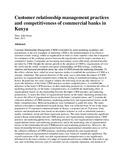| dc.description.abstract | Customer Relationship Management (CRM) is heralded by some marketing academics and practitioners as the new paradigm of marketing. CRM is the implementation of an effective customer-centric strategy within an organization in order to create superior value that is required for sustenance of the exchange process between the organization and its target customers in a competitive market. Companies are becoming increasingly aware ofthe many potential benefits provided by CRM. Despite the intense growth in the adoption of CRM by organizations all over the world and the widely accepted conceptual underpinnings ofCRM strategy, conflicting opinions and increased pessimism about the value of CRM abound the marketing literature. To this effect, scholars have called for more rigorous studies to establish the usefulness of CRM as a strategic orientation.
The general objective of this study was to determine the impact of CRM practices on organizational competitiveness within the setting of commercial banking sector in Kenya. In particular, the study sought to address the following seven specific objectives:
1) assess the influence of the banks' CRM practices on their competitiveness,
2) establish the influence of the banks' CRM practices on their marketing productivity,
3) determine the effect of marketing productivity on the banks' competitiveness,
4) establish the moderating effect of organizational factors on the relationship between the banks' CRM practices and marketing productivity,
5) assess the effect of organizational factors on the banks' marketing productivity,
6) assess the effect of organizational factors on the banks' competitiveness, and
7) evaluate the collective influence of CRM practices, marketing productivity and organizational factors on the banks' competitiveness.
Relevant hypotheses were formulated to guide the study. The study utilized a descriptive correlational research design. Data was collected from 34 out of the target population of 43 registered commercial banks in Kenya; a response rate of 79 percent. Data analysis and interpretation were based on descriptive statistics as well as inferential statistics mainly correlation, factor and linear regression analyses. The study found statistically significant positive linear relationships between CRM practices and organizational competitiveness, CRM practices and marketing productivity, marketing productivity and organizational competitiveness, organizational factors and marketing productivity and in the moderating role of organizational factors on the relationship between CRM practices and marketing productivity. However,. the linear relationship between organizational factors and organizational competitiveness as well as the collective influence of CRM practices, marketing productivity and organizational competitiveness on organizational competitiveness were found not statistically significant.
The overall conclusion of the study was that organizational competitiveness is not significantly influenced by the mere existence of a range of organizational factors within the firm such as age, size, and ownership structure, type of customers served, corporate reputation, and duration of CRM implementation or even technology level. Rather, organizational competitiveness is achieved through appropriate CRM practices and marketing productivity. However, organizational factors positively facilitate the relationship between CRM practices and marketing productivity thus indirectly enhancing organizational competitiveness.
The results of this study have significant managerial and academic contributions. In particular, the study gives managers invaluable insights on how to effectively build their CRM strategy and leverage on their organizational factors to enhance the influence of CRM practices on marketing productivity and organizational competitiveness. The findings of the study are also useful in addressing the increasing pessimism about CRM validity and existing research gaps on the need to develop elaborate conceptual frameworks of CRM strategy and test them empirically. In addition, the study offers valuable scholarly contribution on the impact of CRM practices in the commercial banking sector in Kenya. However, the study is not without a few limitations. First, the variables included in the study's conceptual framework are certainly not exhaustive.
Future researchers could include more variables and alternative measures to assess the effectiveness of CRM strategy. Second, the study did not seek to establish the antecedents of organizational CRM practices. Further limitations of the study included using a crosssectional research design, relying on self-reported- data mainly from the firm's perspective alone and using a single industry setting. Future research could seek to address these limitations by establishing the antecedents of CRM practices; using a longitudinal research design; assessing external respondents such as customers, competitors and distributors on CRM strategy performance besides internal finn respondents; and using multiple industry settings to conduct their studies. This will enhance the validity and generalizability of future research findings on CRM strategy. Although this study has the few cited limitations with respect to conceptualization and methodology, it will nevertheless stimulate intellectual curiosity and serve as a useful reference for future research and managerial undertakings on CRM strategy. | en_US |

